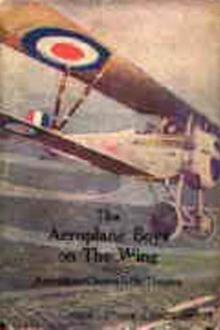Genre Adventure. Page - 10

g, and the two mates having their hands full in driving forward the work of finishing the lading, so that the hatches might be on and things in some sort of order before the crew should be needed to make sail.
The decks everywhere were littered with the stuff put aboard from the lighter that left the brig just before I reached her, and the huddle and confusion showed that the transfer must have been made in a tearing hurry. Many of the boxes gave no hint of what was inside of them; but a good deal of the stuff--as the pigs of lead and cans of powder, the many five-gallon kegs of spirits, the boxes of fixed ammunition, the cases of arms, and so on--evidently was regular West Coast "trade." And all of it was jumbled together just as it had been tumbled aboard.
I was surprised by our starting with the brig in such a mess--until it occurred to me that the captain had no choice in the matter if he wanted to save the tide. Very likely the tide did enter into his calculations; but I was led to believe

you might incautiously give the show away. You had a good passage?"
"Excellent," replied von Ruhle. "I am getting well-known to the strafed English custom-house officers at Queenboro' and Harwich. They recognize me by my stick, I believe, but they little know that it is a new one every time. What do you think of this? I have brought it as a specimen for you to see. Just fancy! every time I cross to Holland twenty kilogrammes of good copper are on their way to the Fatherland. By this time Herr Stabb of Essen is well acquainted with my Malacca canes."
"A good weight to carry about," remarked Ramblethorne, wielding the disguised bar of copper. "I wonder you troubled."
"Mein Gott! I could not leave it," declared von Ruhle. "Someone might take a fancy to it, and then the secret would be out. But tell me: have you succeeded in getting that commission you spoke of?"
"I am still living in hopes," replied Ramblethorne. "Of course I could have obtained a post of temporary surgeon in the Brit

f hearing the stage-door keeper carry out Joseph's instructions as far as Hermann was concerned. Had Nobel's address been on the card all this would have been superfluous. As the address was missing, the little scheme was absolutely necessary.
There was just a chance, of course, that Hermann might deny all knowledge of Moore's prospective quarry, not that Moore had much fear of this, after the episode of the borrowed cloak and the play-part. Hermann stood flushed and smiling as he received the compliments of fellow comedians. Moore watched him keenly as the stage-door keeper delivered the card and the message.
"Most extraordinary," Hermann muttered. "You say that Mr. Nobel was here himself. What was he like?"
"Big gentleman, sir, strong foreign accent and deaf as a post."
Hermann looked relieved, but the puzzled expression was still on his face.
"All right, Blotton," he said. "Send somebody out to call a cab for me in ten minutes. Sorry I can't come and sup with you fellows

ice was sharpened as from anxiety. "Won't you come and see him about the petrol?"
He looked at her curiously. The smile had gone from her lips, and her face was pale. She was frowning, and in her eyes there showed unmistakable fear. She was not looking at him, and his gaze followed the direction of hers.
The driver had come out of the shed, the same dark, aquiline-featured man as had passed him on the bridge. He had stopped and was staring at Merriman with an intense regard in which doubt and suspicion rapidly changed to hostility. For a moment neither man moved, and then once again the girl's voice broke in.
"Oh, there is father," she cried, with barely disguised relief in her tones. "Come, won't you, and speak to him."
The interruption broke the spell. The driver averted his eyes and stooped over his engine; Merriman turned towards the girl, and the little incident was over.
It was evident to Merriman that he had in some way put his foot in it, how he could not imagine, un

ine finally recovered, but he was shockingly disfigured for life. He afterwards told how he came upon the tracks of Broadus, and on reaching the spot where Broadus had received his death wound, he was suddenly attacked by a huge she-bear that was followed by two small cubs. The bear had evidently been severely wounded by Broadus and was in a terrible rage. She seized Jabine before he could turn to flee, and falling with her whole weight upon his body and chest, began biting his face. He soon lost consciousness from the pressure upon his chest, and remembered no more.
The poor fellow became a misanthrope, owing to his terrible disfigurement, and was finally found drowned in the river near Coloma.
In 1850 a number of miners were camped upon the spot where the little town of Todd's Valley now stands. Among them were three brothers named Gaylord, who had just arrived from Illinois. These young men used to help out the proceeds of their claim by an occasional hunt, taking their venison down to the ri

return of its victims, and the other by the almost inviolate safeguards with which it surrounded the prisoners. The return to prison indeed resembled nothing less than a triumph.
The trial recommenced. It was at first attended by the same results as the preceding one. The four accused were protected by an alibi, patently false, but attested by a hundred signatures, and for which they could easily have obtained ten thousand. All moral convictions must fail in the presence of such authoritative testimony. An acquittal seemed certain, when a question, perhaps involuntarily insidious, from the president, changed the aspect of the trial.
"Madam," said he to the lady who had been so kindly assisted by one of the highwaymen, "which of these men was it who tendered you such thoughtful attention?"
This unexpected form of interrogation confused her ideas. It is probable that she believed the facts to be known, and saw in this a means of modifying the fate of the man who interested her.
"It w

from the Secretary to the Foreign Department, Government of India, confirms the intelligence that Chinese emissaries have for some time past been endeavouring to re-establish the former predominance of their nation over Tibet and Bhutan. In the former country they appear to have met with little success; but in Bhutan, taking advantage of the hereditary jealousies of the Penlops, the great feudal chieftains, they appear to have gained many adherents. They aim at instigating the Bhutanese to attempt an invasion of India through the duars leading into Eastern Bengal, their object being to provoke a war. The danger to this country from an invading force of Bhutanese, even if armed, equipped, and led by Chinese, is not great. But its political importance must not be minimised.
"'For the most serious feature of the movement is that information received by the Political Department gives rise to the grave suspicion that, not only many extremists in Bengal, but even some of the lesser rajahs a

at he was in the hands of the police. Garth noticed also as he entered the car that the passengers were not aware of the substitution. He resented the repugnance in the glances they turned on the mask. Simmons' attitude toward life became comprehensible. But, as the journey extended itself interminably, Garth grew restless. He realized he was in the position of a man entering a cavern without a light. He must feel his way step by step. He must walk blindly toward innumerable and fatal pitfalls.
At last the train paused for the change from locomotive to electric motor. Although he knew that normally no passengers would board it at this place, he gazed anxiously from the window. A man stood close to the track with the evident intention of entering the train. Garth saw him elude a brakeman, saw him grasp the railing and swing himself out of sight. A moment later the man walked into the car, stopped dead, and turned sharp, inquisitive eyes on the gray mask.
About the figure was a somber air, accentu

topped more than once, and, loitering along, it was dark when they neared their destination.
As they would have drawn up to the wharf there was a sudden flash of light--gone in a moment--followed by a dark body that swished by them like a flash.
Frank uttered an exclamation of astonishment.
"See that?" he demanded.
"Yes. What could it have been?"
"You've got me, but it's heading toward the open sea. Great Scott! Maybe it's an enemy."
"An enemy?"
"Yes; you know how anxious the Germans are over this submarine business. Maybe this fellow has been spying about. May be going to report to a German submarine out there some place."
"Think we had better follow and have a look?" asked Jack.
"Believe it would be a good idea. Let's go."
Without another word, Jack brought the boat about and headed after the one that had so recently dashed by them. In the darkness ahead there was nothing to be seen.
"Like looking for a needle in a haystack," Jack

never would Frank be apt to forget the look of absolute terror he discovered upon the agonized face of the bully. Puss had detected the presence of some one near by, and was trying to shout, as well as stretch his appealing hands out, though not with much success.
He actually went under while Frank looked; and the heart of the would-be rescuer almost stood still with a terrible fear that that was the end.
But he kept on, and in another moment a head once more bobbed up, with Puss threshing the water frantically. Once he had gone down. According to what most people said, he would possibly vanish twice more, and after that never rise again.
If anything was to be done, there was no time for delay. Frank was within ten feet of the struggling figure when it came up. He immediately dove, and managed to rise to the surface behind Puss. Then, just as the other was floundering beneath the surface of the agitated water again, Frank caught hold of his sweater close to his neck, and held on with migh